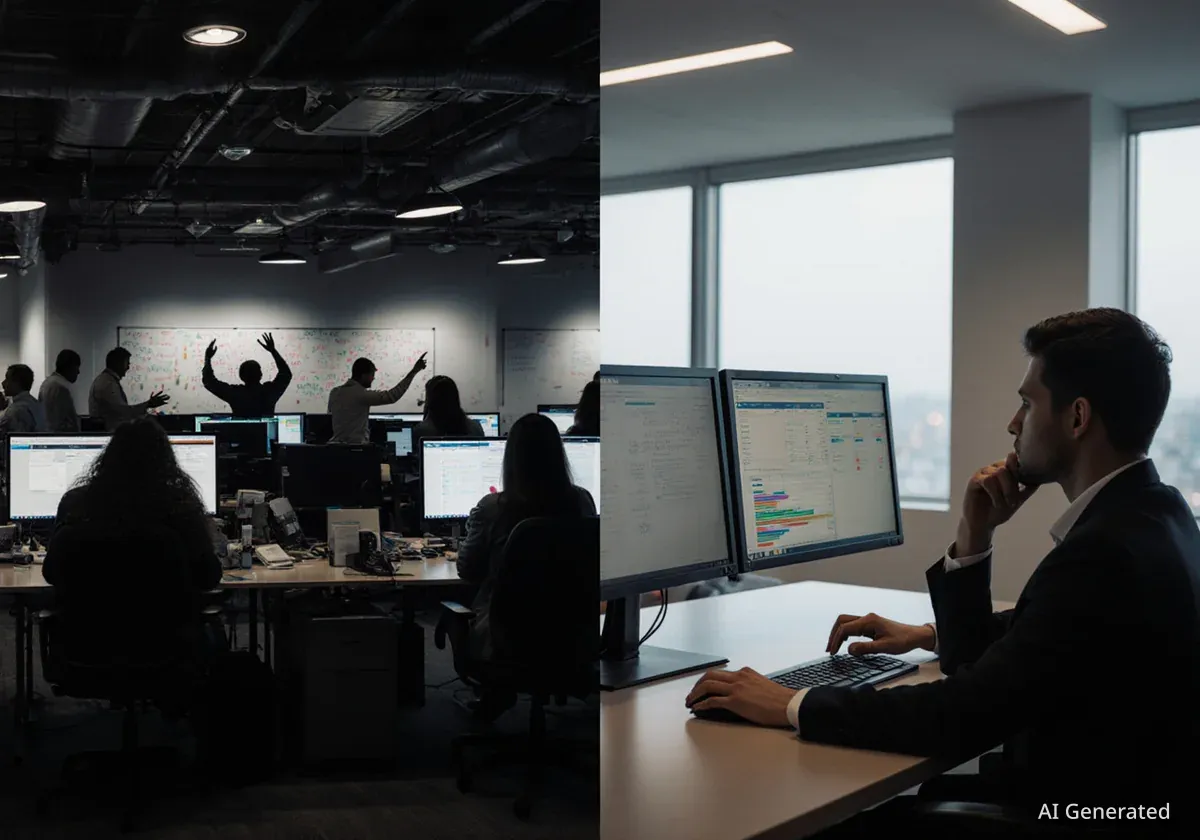In the competitive landscape of artificial intelligence, Alphabet is leveraging its established dominance in search and its rapidly expanding cloud division to position itself for significant future growth. An analysis of market dynamics suggests that the company's integrated ecosystem could enable it to challenge the combined market value of AI sector leaders Nvidia and Palantir Technologies by the end of the decade.
Key Takeaways
- Alphabet is integrating AI into its core search products, reaching billions of users through existing platforms like Chrome and Android.
- Google Cloud is a primary growth driver, with its revenue increasing 32% and operating profit more than doubling in a recent quarter.
- Potential risks for competitors include Nvidia's reliance on hardware sales and Palantir's high stock valuation.
- Alphabet's autonomous driving unit, Waymo, represents a significant long-term growth opportunity as it expands its robotaxi services.
Alphabet's Integrated AI Ecosystem
Alphabet's strategy in the artificial intelligence sector is built upon its vast existing infrastructure and user base. The company is enhancing its search engine, the primary entry point to the internet for billions, with integrated AI features rather than attempting to create entirely new consumer habits.
Features like AI Overviews are reportedly used by over two billion people monthly. The company is also rolling out an AI Mode that allows users to switch between traditional search results and a chatbot interface within the same application. This seamless integration is supported by its control over the Chrome browser and the Android operating system, giving it a powerful distribution advantage.
Consumer and Cloud AI Momentum
On the consumer front, Alphabet's Gemini app has shown strong adoption, at one point surpassing ChatGPT as the most downloaded application in the Apple App Store. This indicates growing traction for its consumer-facing AI tools.
However, the most significant growth driver for the company is its cloud computing division. Google Cloud has demonstrated substantial financial momentum, with recent figures showing a 32% jump in revenue and a doubling of operating profit. This performance is attributed to its vertically integrated model.
Full-Stack Advantage
Google Cloud operates across the entire technology stack, from its proprietary Gemini AI models and custom AI chips (Tensor Processing Units) to advanced analytics software and one of the world's largest private fiber networks. This integration allows for optimized performance and potentially lower operational costs.
Furthermore, the pending acquisition of cloud cybersecurity firm Wiz is expected to create significant opportunities for cross-selling security services to its extensive enterprise customer base.
The Autonomous Driving Frontier
Beyond its core software and cloud businesses, Alphabet has a major long-term investment in autonomous driving through its subsidiary, Waymo. After years of development, Waymo is now operating and expanding commercial robotaxi services in several major U.S. cities.
The company holds a first-mover advantage in the autonomous ride-hailing market, with active fleets in cities like Phoenix and San Francisco and testing underway in others. If the autonomous vehicle sector experiences significant adoption over the next five years, Waymo could evolve into a major revenue stream for Alphabet, separate from its advertising and cloud segments.
Market Capitalization Context
As of recent market data, Nvidia's market capitalization stands at approximately $4.3 trillion, and Palantir's is around $425 billion. Alphabet's valuation is roughly $3 trillion. The analysis suggests Alphabet's diverse growth areas could help close this gap.
Comparative Analysis of Competitor Risks
While Nvidia and Palantir are prominent players in the AI boom, they face distinct challenges that could impact their long-term growth trajectories. These challenges contrast with Alphabet's more diversified business model and current valuation.
Nvidia's Hardware-Centric Model
Nvidia has been a primary beneficiary of the demand for AI computing power. However, its business is predominantly based on hardware sales, specifically graphics processing units (GPUs). Hardware revenue is not typically recurring, as each sales cycle depends on new customer spending.
"Hardware sales are not recurring revenue, since every chip sold has to be replaced by the next cycle of spending, and once customers find a cheaper or more efficient solution, the shift can happen fast."
A significant risk comes from the rise of custom AI chips, or application-specific integrated circuits (ASICs). As the AI market shifts from training models to inference (running the models), which is a continuous operational cost, large cloud providers are increasingly motivated to develop their own in-house chips to reduce expenses. Inference is less technically demanding than training, which could diminish the competitive advantage of Nvidia's CUDA software platform in this area.
Palantir's Valuation Concerns
Palantir has seen strong demand for its Artificial Intelligence Platform (AIP) from commercial customers and continues to secure large government contracts. The company has demonstrated solid execution in its niche.
However, its stock valuation presents a potential risk. According to some market analyses, Palantir trades at a forward price-to-sales multiple exceeding 100. Such a high valuation often implies significant future growth is already priced in, leaving little room for error. Any slowdown in growth could lead to a sharp correction in the stock price.
Valuation and Future Outlook
In contrast to some of its peers, Alphabet's stock is considered to be more modestly valued. It currently trades at a forward price-to-earnings (P/E) ratio of less than 23 times its estimated 2026 earnings. This valuation, combined with its multiple high-growth initiatives, suggests potential for further appreciation.
The combination of a dominant and AI-enhanced search business, a rapidly scaling and profitable cloud division, and a pioneering autonomous vehicle unit positions Alphabet with multiple avenues for expansion. When viewed alongside the specific risks faced by competitors in the AI hardware and high-valuation software sectors, Alphabet presents a compelling case for sustained long-term growth through the end of the decade.





